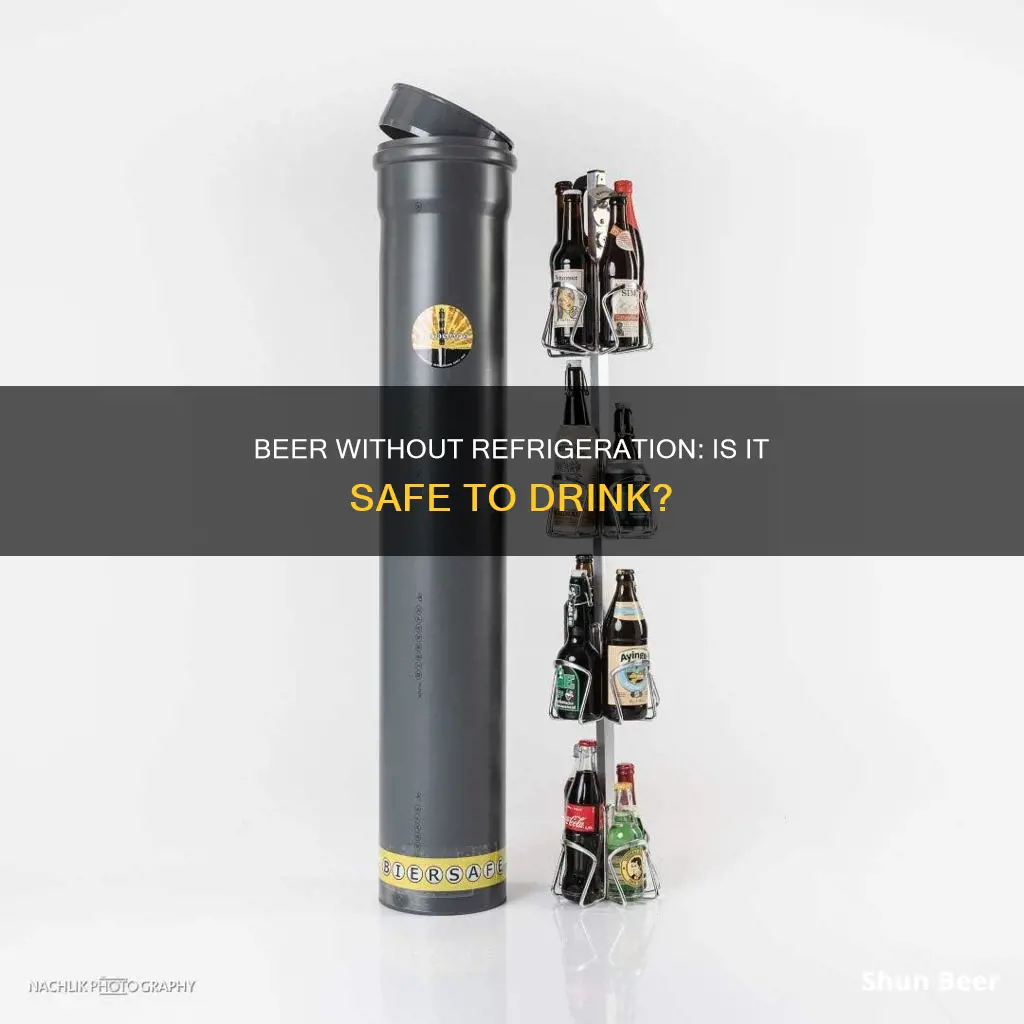
It is a common misconception that if a cold beer becomes warm and is then cooled down again, it will spoil, or more specifically, skunk. However, this is not true. Skunking occurs when beer is lightstruck, or in other words, exposed to light, not by temperature fluctuations. Beer can be left at room temperature and will be absolutely fine as long as it is not stored in a hot place, such as a car under the hot sun, where the temperature could rise drastically and spoil the beer.
| Characteristics | Values |
|---|---|
| Beer going bad if not refrigerated | Beer does not go bad if it is not refrigerated, but it is best preserved when kept cold. |
| Beer going bad if it warms up after being refrigerated | It is a myth that beer will spoil if it warms up after being refrigerated. |
| Beer going bad if it is refrigerated after warming up | It is fine to refrigerate beer after it has warmed up. |
| Beer going bad if exposed to light | Beer exposed to light can go bad. |
| Beer going bad if exposed to extreme temperature fluctuations | Beer can go bad if exposed to extreme temperature fluctuations (e.g. 100+ Fahrenheit to below freezing). |
| Beer going bad if not refrigerated during transportation | It is fine to buy refrigerated beer and let it warm up before refrigerating again. Beer typically undergoes multiple temperature changes during transportation. |
| Beer going bad if not refrigerated immediately after purchase | It is not necessary to refrigerate beer immediately after purchase. Beer can be stored in a cool, dry place out of direct sunlight. |
| Beer going bad based on the type | IPAs gradually lose their flavour and aroma over time and are best drunk sooner rather than later. Porters and stouts can improve with age if kept in cool, dark storage. |
What You'll Learn

Beer can be left out of the fridge
It is a common misconception that beer will spoil if it is allowed to warm up after being refrigerated. The idea that temperature cycling "skunks" beer is a myth. In reality, skunking is caused by lightstrike, not temperature changes. Beer that has been refrigerated can be left out of the fridge and will be fine to drink, as long as it is not exposed to extreme temperature fluctuations or direct sunlight.
When beer is exposed to warm temperatures, it can affect its flavour and shelf life. Beer is best preserved when kept cold, and its flavour will last longer if it is stored at a steady cool temperature. However, a small number of temperature changes will not significantly impact the taste of the beer. Beer that has been left out of the fridge for a short period of time can be safely returned to the fridge and consumed later.
It is important to note that different types of beer have varying sensitivities to temperature changes. Hoppy beers, such as IPAs, are more sensitive to temperature swings and should be consumed within 30-45 days of purchase. On the other hand, richer and higher ABV beers, such as porters and stouts, can actually improve with age if stored in cool, dark conditions.
Beer that has been left out of the fridge should be stored in a cool, dry place, away from direct sunlight, and any extreme temperature changes. As long as these conditions are met, it is safe to return the beer to the fridge and consume it at a later time. However, it is always recommended to store beer in a refrigerator to maintain its optimal flavour and freshness.
Beer and Bellyaches: What's the Connection?
You may want to see also

Beer can be drunk after being refrigerated and then left out
However, there are a few things to keep in mind. Firstly, extreme temperature fluctuations (such as from freezing to over 100 degrees Fahrenheit) and direct sunlight should be avoided as they can affect the flavour and cause the beer to spoil. Secondly, the type of beer matters; IPAs, for example, are more sensitive to temperature changes and should be consumed within 30-45 days of purchase. Finally, while it is safe to drink beer that has been left out and then re-chilled, it is still best to store beer in a cool, dry place and minimise temperature changes to maintain optimal flavour and freshness.
In summary, it is safe to drink beer that has been refrigerated and then left out, but it is important to avoid extreme temperature changes and direct sunlight, and to consume certain types of beer, like IPAs, within a reasonable timeframe.
Drinking Beer in Public: Illinois' Laws Explained
You may want to see also

Extreme temperature fluctuations can ruin beer
Extreme temperature fluctuations can indeed ruin beer. While slight temperature changes will not spoil your beer, large temperature changes will.
The "skunky" flavour in beer is actually lightstrike, which is caused by light, not temperature. However, temperature fluctuations can still negatively impact the overall flavour and chemistry of the beverage. For example, exposing beer to very warm temperatures can affect its flavour in a matter of a couple of days. Hop flavours and aromas will be diminished, and malt flavours that used to remind you of chocolate and caramel will begin to meld into a generic sickly "sweet" flavour. In some beers, reminders of wet cardboard and paper can also develop.
Additionally, if the temperature fluctuates enough times during the life of a particular bottle, the closure will start to loosen, allowing oxygen to get in and make the beer go flat.
Therefore, it is best to keep beer cold when you can, but don't worry about beer warming up and then cooling again—this will usually be fine to drink, and as long as it wasn't kept warm for too long, the flavour likely won't change.
Oral Sex, Beer, and Yeast Infections: What's the Link?
You may want to see also

Beer should be stored upright
Beer should always be stored upright, even if it is in a corked bottle. Storing beer upright minimises the amount of beer that is exposed to oxygen, which slows the rate of oxidation within the beer. This is important because, as the beer ages, oxygen will react with the beer's molecules, causing it to lose its flavour and aroma.
Storing beer upright is also related to yeast. If a beer is left on its side, a yeast ring or watermark can form inside the bottle from the dead yeast cells, which will not settle. By storing the beer upright, the yeast will compact at the bottom of the bottle, minimising its influence on the flavour of the beer.
Another reason to store beer upright is to prevent leaks. Bottled beer is at a higher risk of oxygen exposure than canned beer, and keeping it on its side makes it more prone to air leaks.
Finally, storing beer upright is also recommended for practical reasons. If you store your beer on its side, you will need to find a lot of space in your fridge or cellar. Old filing cabinets are a great beer storage unit!
Beer Olympics: Competitive Drinking Games Explained
You may want to see also

Beer can be drunk after its 'best before' date
Beer can be drunk after its best-before date, but it depends on the type of beer and how it has been stored.
Beers with a higher alcohol content, such as porters and stouts, can improve with age if kept in cool, dark storage conditions like a basement or cellar. However, IPAs, especially hoppy ones, do not fall into this category. They gradually lose their flavour and aroma over time and are best drunk sooner rather than later.
Beer has a 'best before' date, which is different from a 'use by' date. 'Use by' is a rule and degradation happens quickly after the stated date. 'Best before' is more of a guideline on quality, and the item will start to lose its quality after the stated date but can still be consumed.
A typical lager will be drinkable 6-24 months after its best-before date if it has been kept in the fridge, and up to 9 months if it hasn't been refrigerated.
Temperature does affect beer. Beer is best preserved when kept cold. Keeping beer at room temperature can reduce its shelf life from nearly six months to only a few weeks, and exposing it to very warm temperatures can affect its flavour in a matter of days. Extreme temperature fluctuations (from 100+ degrees Fahrenheit to below freezing) should be avoided, as this may also cause the beer to explode.
However, it is a myth that temperature cycling ruins beer. If this were the case, all beer imported from Europe would be destroyed before it was sold.
Beer for Slugs: Does It Work?
You may want to see also
Frequently asked questions
Beer can be drunk without being refrigerated, but it is best preserved when kept cold. Beer that is not refrigerated will have a shorter shelf life and may develop a generic "sweet" flavour.
It is a common misconception that temperature cycling "skunks" beer. In reality, beer will be fine if it is left out to warm up and then cooled down again. However, beer is best kept cold to preserve its flavour.
Skunking is when beer becomes "skunky" or spoiled. This is caused by light exposure, not temperature fluctuations.
A bad beer will have an obvious bad aroma. It may also lack the usual 'pssst' sound and foaming when opened, and there may be excessive sediment at the bottom of the bottle.







